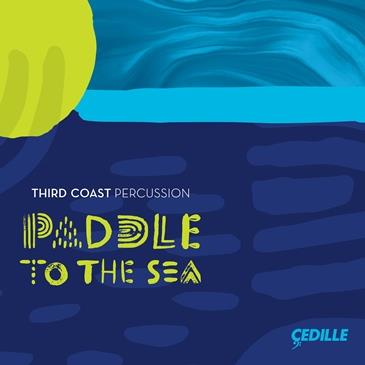by Jarrett Hoffman

But an ecosystem takes more than just one beautiful story. Third Coast surrounds the title work with the vastly differing colors of three aquatic creatures — water-themed works that inspired the film score’s composition. As a whole, the result from this Grammy-winning quartet out of Chicago is deep and wide-ranging, impressive and highly creative.
The title work, spanning ten tracks, marks the little boat’s journey with a fascinating assortment of sounds and moods. “Open Water” grooves, evoking hip-hop in a dance between mallet and hand percussion. Earthly pressure builds from “The Stewards” into “Niagara,” sending you over the falls. And “Sanctuary” is just that — time stands still, enters into itself. Alongside those highlights are a few less evocative tracks and transitions, probably better-suited to live performance with the film than to CD.
Next up is the five-minute Chigwaya (“the bream fish”), a traditional song used to call water spirits in the Shona religion of Zimbabwe. Third Coast has studied Shona music with their mentor Musekiwa Chingodza — here the group performs their interpretation of his arrangement, which they’ve tailored around the mbira, a thumb piano important to Shona music.
The mbira has a beautiful sound, otherworldly like a celesta, but crisp. The melodic ostinato on those instruments, coupled with snare-like vibrations, sets a mesmerizing foundation. Soon the quartet layer their own voices smoothly on top.
Scattered movements from two other works surround Paddle to the Sea and Chigwaya. Jacob Druckman’s Reflections on the Nature of Water (1986) comes with the more straightforward story as an established part of the solo marimba repertoire. David Skidmore, Robert Dillon, Peter Martin, and Sean Connors rotate through the six movements, each meant to embody a different character of water: Crystalline, Fleet, Tranquil, Gently Swelling, Profound, and Relentless.
The group’s arrangement of four selections by Philip Glass arrives on a more complicated path. The pieces began their lives on the piano alongside dance in Glass’s 12 Pieces for Ballet. For their own version, Third Coast drew on both the original and on the Brazilian group Uakti’s arrangement, known as Aguas da Amazonia. The percussion quartet kept Uakti’s title and the inspiration of the Amazon River and its tributaries.
The performances are excellent. Skidmore, Dillon, Martin, and Connors capture Druckman’s six water characters and more, ably traversing the virtuosic writing. The group’s arrangements of Glass are entrancing, and along with the Druckman and Chigwaya, come through as subtle yet important connections to the film score.
The interweaving of Druckman and Glass doesn’t capture the same feeling, but framing the album with Glass was a special curatorial feat. Beginning and ending with the lulling Madeira and Amazon Rivers — in these sensitive hands and on this amazing array of instruments — feels truly sea-like, and spiritual.
Paddle to the Sea was released last week on the Cedille Records label.
Published on ClevelandClassical.com February 14, 2018.
Click here for a printable copy of this article



